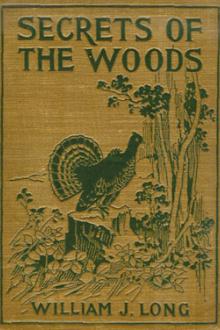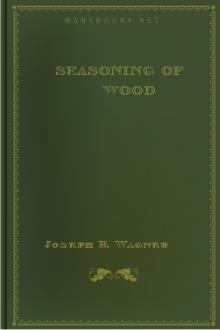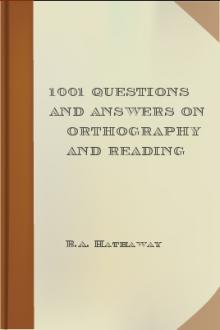Secret of the Woods - William J. Long (e reader for manga .txt) 📗

- Author: William J. Long
- Performer: -
Book online «Secret of the Woods - William J. Long (e reader for manga .txt) 📗». Author William J. Long
Next morning I was early afield, heading for a ridge where I thought the deer of the neighborhood might congregate with the intention of yarding for the winter. At the foot of a wild little natural meadow, made centuries ago by the beavers, I found the trail of two deer which had been helping themselves to some hay that had been cut and stacked there the previous summer. My big buck was not with them; so I left the trail in peace to push through a belt of woods and across a pond to an old road that led for a mile or two towards the ridge I was seeking.
Early as I was, the wood folk were ahead of me. Their tracks were everywhere, eager, hungry tracks, that poked their noses into every possible hiding place of food or game, showing how the two-days’ fast had whetted their appetites and set them to running keenly the moment the last flakes were down and the storm truce ended.
A suspicious-looking clump of evergreens, where something had brushed the snow rudely from the feathery tips, stopped me as I hurried down the old road. Under the evergreens was a hole in the snow, and at the bottom of the hole hard inverted cups made by deer’s feet. I followed on to another hole in the snow (it could scarcely be called a trail) and then to another, and another, some twelve or fifteen feet apart, leading in swift bounds to some big timber. There the curious track separated into three deer trails, one of which might well be that of a ten-point buck.
Here was luck,—luck to find my quarry so early on the first day out, and better luck that, during my long absence, the cunning animal had kept himself and his consort clear of Old Wally and his devices.
When I ran to examine the back trail more carefully, I found that the deer had passed the night in a dense thicket of evergreen, on a hilltop overlooking the road. They had come down the hill, picking their way among the stumps of a burned clearing, stepping carefully in each other’s tracks so as to make but a single trail. At the road they had leaped clear across from one thicket to another, leaving never a trace on the bare even whiteness. One might have passed along the road a score of times without noticing that game had crossed. There was no doubt now that these were deer that had been often hunted, and that had learned their cunning from long experience.
I followed them rapidly till they began feeding in a little valley, then with much caution, stealing from tree to thicket, giving scant attention to the trail, but searching the woods ahead; for the last “sign” showed that I was now but a few minutes behind the deer. There they were at last, two graceful forms gliding like gray shadows among the snow-laden branches.
But in vain I searched for a lordly head with wide rough antlers sweeping proudly over the brow; my buck was not there. Scarcely had I made the discovery when there was a whistle and a plunge up on the hill on my left, and I had one swift glimpse of him, a splendid creature, as he bounded away.
By way of general precaution, or else led by some strange sixth sense of danger, he had left his companions feeding and mounted the hill, where he could look back on his own track. There he had been watching me for half an hour, till I approached too near, when he sounded the alarm and was off. I read it all from the trail a few moments later.
It was of no use to follow him, for he ran straight down wind.
The two others had gone quartering off at right angles to his course, obeying his signal promptly, but having as yet no idea of what danger followed them. When alarmed in this way, deer never run far before halting to sniff and listen. Then, if not disturbed, they run off again, circling back and down wind so as to catch from a distance the scent of anything that follows on their trail.
I sat still where I was for a good hour, watching the chickadees and red squirrels that found me speedily, and refusing to move for all the peekings and whistlings of a jay that would fain satisfy his curiosity as to whether I meant harm to the deer, or were just benumbed by the cold and incapable of further mischief.
When I went on I left some scattered bits of meat from my lunch to keep him busy in case the deer were near; but there was no need of the precaution. The two had learned the leader’s lesson of caution well, and ran for a mile, with many haltings and circlings, before they began to feed again. Even then they moved along at a good pace as they fed, till a mile farther on, when, as I had forelayed, the buck came down from a hill to join them, and all three moved off toward the big ridge, feeding as they went.
Then began a long chase, a chase which for the deer meant a straightaway game, and for me a series of wide circles—never following the trail directly, but approaching it at intervals from leeward, hoping to circle ahead of the deer and stalk them at last from an unexpected quarter.
Once, when I looked down from a bare hilltop into a valley where the trail ran, I had a most interesting glimpse of the big buck doing the same thing from a hill farther on too far away for a shot, but near enough to see plainly through my field glass. The deer were farther ahead than I supposed. They had made a run for it, intending to rest after first putting a good space between them and anything that might follow. Now they were undoubtedly lying down in some faraway thicket, their minds at rest, but their four feet doubled under them for a jump at short notice.
Trust your nose, but keep your feet under you—that is deer wisdom on going to sleep. Meanwhile, to take no chances, the wary old leader had circled back, to wind the trail and watch it awhile from a distance before joining them in their rest.
He stood stockstill in his hiding, so still that one might have passed close by without noticing him. But his head was above the low evergreens; eyes, ears, and nose were busy giving him perfect report of everything that passed in the woods.
I started to stalk him promptly, creeping up the hill behind him, chuckling to myself at the rare sport of catching a wild thing at his own game. But before I sighted him again he grew uneasy (the snow tells everything), trotted down hill to the trail, and put his nose into it here and there to be sure it was not polluted.
Then—another of his endless devices to make the noonday siesta full of contentment—he followed the back track a little way, stepping carefully in his own footprints; branched off on the other side of the trail, and so circled swiftly back to join his little flock, leaving behind him a sad puzzle of disputing tracks for any novice that might follow him.
So the interesting chase went on all day, skill against keener cunning, instinct against finer instinct, through the white wonder of the winter woods, till, late in the afternoon, it swung back towards the starting point. The deer had undoubtedly intended to begin their yard that day on the ridge I had selected; for at noon I crossed the trail of the two from the haystack, heading as if by mutual understanding in that direction. But the big buck, feeling that he was followed, cunningly led his charge away from the spot, so as to give no hint of the proposed winter quarters to the enemy that was after him. Just as the long shadows were stretching across all the valleys from hill to hill, and the sun vanished into the last gray bank of clouds on the horizon, my deer recrossed the old road, leaping it, as in the morning, so as to leave no telltale track, and climbed the hill to the dense thicket where they had passed the previous night.
Here was my last chance, and I studied it deliberately. The deer were there, safe within the evergreens, I had no doubt, using their eyes for the open hillside in front and their noses for the woods behind. It was useless to attempt stalking from any direction, for the cover was so thick that a fox could hardly creep through without alarming ears far less sensitive than a deer’s. Skill had failed; their cunning was too much for me. I must now try an appeal to curiosity.
I crept up the hill flat on my face, keeping stump or scrub spruce always between me and the thicket on the hilltop. The wind was in my favor; I had only their eyes to consider. Somewhere, just within the shadow, at least one pair were sweeping the back track keenly; so I kept well away from it, creeping slowly up till I rested behind a great burned stump within forty yards of my game. There I fastened a red bandanna handkerchief to a stick and waved it slowly above the stump.
Almost instantly there was a snort and a rustle of bushes in the thicket above me. Peeking out I saw the evergreens moving nervously; a doe’s head appeared, her ears set forward, her eyes glistening. I waved the handkerchief more erratically. My rifle lay across the stump’s roots, pointing straight at her; but she was not the game I was hunting. Some more waving and dancing of the bright color, some more nervous twitchings and rustlings in the evergreens, then a whistle and a rush; the doe disappeared; the movement ceased; the thicket was silent as the winter woods behind me.
“They are just inside,” I thought, “pawing the snow to get their courage up to come and see.” So the handkerchief danced on—one, two, five minutes passed in silence; then something made me turn round. There in plain sight behind me, just this side the fringe of evergreen that lined the old road, stood my three deer in a row—the big buck on the right—like three beautiful statues, their ears all forward, their eyes fixed with intensest curiosity on the man lying at full length in the snow with the queer red flag above his head.
My first motion broke up the pretty tableau. Before I could reach for my rifle the deer whirled and vanished like three winks, leaving the heavy evergreen tips nodding and blinking behind them in a shower of snow.
Tired as I was, I took a last run to see from the trail how it all happened. The deer had been standing just within the thicket as I approached. All three had seen the handkerchief; the tracks showed that they had pawed the snow and moved about nervously.
When the





Comments (0)